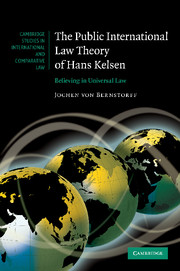Book contents
- Frontmatter
- Contents
- Preface
- Introduction
- PART I The quest for objectivity: the method and construction of universal law
- 1 Method and construction of international law in nineteenth-century German scholarship
- 2 Kelsenian formalism as critical methodology in international law
- 3 An “objective” architecture of international law: Kelsen, Kunz, and Verdross
- PART II The outlines of the cosmopolitan project – the actors, sources, and courts of universal law
- Postscript – on Kelsenian formalism in international law (2010)
- Career sketches: Hans Kelsen, Alfred Verdross, and Josef Laurenz Kunz
- Bibliography
- Index
- CAMBRIDGE STUDIES IN INTERNATIONAL AND COMPARATIVE LAW
- References
2 - Kelsenian formalism as critical methodology in international law
Published online by Cambridge University Press: 03 May 2011
- Frontmatter
- Contents
- Preface
- Introduction
- PART I The quest for objectivity: the method and construction of universal law
- 1 Method and construction of international law in nineteenth-century German scholarship
- 2 Kelsenian formalism as critical methodology in international law
- 3 An “objective” architecture of international law: Kelsen, Kunz, and Verdross
- PART II The outlines of the cosmopolitan project – the actors, sources, and courts of universal law
- Postscript – on Kelsenian formalism in international law (2010)
- Career sketches: Hans Kelsen, Alfred Verdross, and Josef Laurenz Kunz
- Bibliography
- Index
- CAMBRIDGE STUDIES IN INTERNATIONAL AND COMPARATIVE LAW
- References
Summary
On the basis of a new, critical methodology of public law, Kelsen and his students sought to come up with an “objective” architecture of international law. One factor that was particularly influential for Kelsen's theory of international law was his critical engagement with that of Georg Jellinek and the German Staatswillenspositivismus [state-centered positivism]. Kelsen had outlined his fundamental critique of Jellinek's theory of the state already in his Hauptprobleme der Staatsrechtslehre [Main Problems in the Theory of Public Law], and he carried it further in his first monograph on international law, written during the First World War, Das Problem der Souveränität und die Theorie des Völkerrechts [The Problem of Sovereignty and the Theory of International Law]. It is remarkable how deeply Kelsen, in this fundamental work, was influenced by the Wolffian–Kaltenbornian construction of an “objective” international law, combining it with his new methodological approach to public law. In that sense, this monograph, a foundational work for the Vienna School's theory of international law, can be seen as picking up on Kaltenborn's work while turning away emphatically from the international law theories of Georg Jellinek.
A new methodological tool kit
Kelsen's Main Problems in the Theory of Public Law and The Problem of Sovereignty sought to place the traditional doctrine of state and international law on a new methodological foundation. In the final analysis, Kelsen was concerned with nothing less than establishing legal scholarship as an autonomous “scientific” field.
- Type
- Chapter
- Information
- The Public International Law Theory of Hans KelsenBelieving in Universal Law, pp. 44 - 77Publisher: Cambridge University PressPrint publication year: 2010
References
- 2
- Cited by



